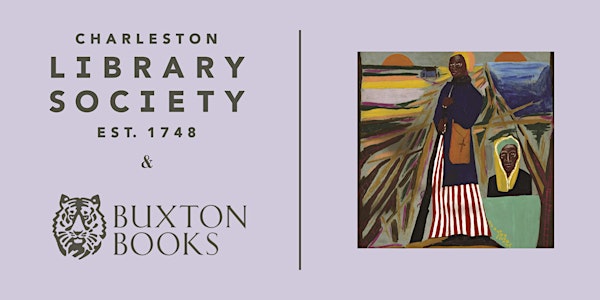The Charleston Library Society and Buxton Books, along with community partners Lowcountry Land Trust and the SC Historical Society, are honored to host renowned author and historian Dr. Edda Fields-Black in conversation to discuss her most recent publication, COMBEE: Harriet Tubman, the Combahee River Raid, and Black Freedom during the Civil War. In her book, Dr. Fields-Black dives into the story of the Combahee River Raid, one of Harriet Tubman’s most extraordinary accomplishments, based on original documents written by a descendant of one of the participants. Helping to shape the conversation will be Chief Conservation Officer of the Lowcountry Land Trust, David Ray.
About the book:
Many biographies, children's books, and films about Harriet Tubman omit a crucial chapter: during the Civil War, hired by the Union Army, she ventured into the heart of slave territory--Beaufort, South Carolina--to live, work, and gather intelligence for a daring raid up the Combahee River to attack the major plantations of Rice Country, the breadbasket of the Confederacy.
Edda L. Fields-Black--herself a descendant of one of the participants in the raid--shows how Tubman commanded a ring of spies, scouts, and pilots and participated in military expeditions behind Confederate lines. On June 2, 1863, Tubman and her crew piloted two regiments of Black US Army soldiers, the Second South Carolina Volunteers, and their white commanders up coastal South Carolina's Combahee River in three gunboats. In a matter of hours, they torched eight rice plantations and liberated 730 people, people whose Lowcountry Creole language and culture Tubman could not even understand. Black men who had liberated themselves from bondage on South Carolina's Sea Island cotton plantations after the Battle of Port Royal in November 1861 enlisted in the Second South Carolina Volunteers and risked their lives in the effort. Fields-Black brings to life intergenerational, extended enslaved families, neighbors, praise-house members, and sweethearts forced to work in South Carolina's deadly tidal rice swamps, sold, and separated during the antebellum period. These formerly enslaved peoples on the Sea Island indigo and cotton plantations, together with those in the semi-urban port cities of Charleston, Beaufort, and Savannah, and on rice plantations in the coastal plains, created the distinctly American Gullah Geechee dialect, culture, and identity--perhaps the most significant legacy of Harriet Tubman's Combahee River Raid.
About Dr. Edda Fields-Black:
Edda Fields-Black teaches history at Carnegie Mellon University and has written extensively about the history of West African rice farmers, including in such works as Deep Roots: Rice Farmers in West Africa and the African Diaspora. She was a co-editor of Rice: Global Networks and New Histories, which was selected as a Choice Outstanding Academic Title. Fields-Black has served as a consultant for the Smithsonian National Museum of African-American History and Culture's permanent exhibit, "Rice Fields of the Lowcountry." She is the executive producer and librettist of "Unburied, Unmourned, Unmarked: Requiem for Rice," a widely performed original contemporary classical work by celebrated composer John Wineglass.
Fields-Black is a descendant of Africans enslaved on rice plantations in Colleton County, South Carolina; her great-great-great grandfather fought in the Combahee River Raid in June 1863. Her determination to illuminate the riches of the Gullah dialect, and to reclaim Gullah Geechee history and culture, has taken her to the rice fields of South Carolina and Georgia to those of Sierra Leone and Republic of Guinea in West Africa.
